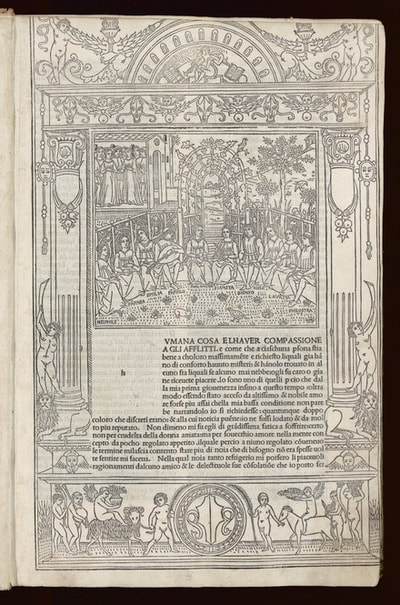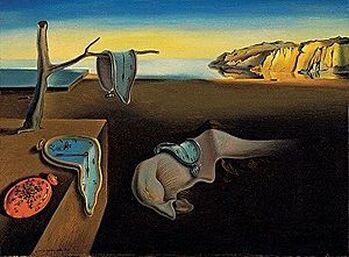|
In 1348, during the time of the Black Death in Italy, a group of seven young women and three young men flee from plague-ridden Florence to a deserted villa in the countryside of Fiesole for two weeks. To pass the evenings, each member of the party tells a story each night, except for one day per week for chores, and the holy days during which they do no work at all, resulting in ten nights of storytelling over the course of two weeks. Thus, by the end of the fortnight they have told 100 stories. Each of the ten persons is in charge of choosing the theme of the stories for that day, and all but two days have topics assigned: examples of the power of fortune; examples of the power of human will; love tales that end tragically; love tales that end happily; clever replies that save the speaker; tricks that women play on men; tricks that people play on each other in general; examples of virtue. Only Dioneo, who usually tells the tenth tale each day, has the right to tell a tale on any topic he wishes, due to his wit. Thus is the story written by Italian writer Giovanni Boccaccio, a few years after the epidemic of Black Death in Italy. Now, more than 600 years later, Giovanni Boccaccio's Italy is attacked by a new pandemic caused by a virus called Covid-19, and the whole country is being on National quarantine. The people who love to chat and laugh and being close to each other now all have to stay at home, and go out only if necessary, with facial masks, no smiles and at least 1 meter from each other. But the Italian people are living, not surviving, as Paola Locati of Milan wrote: "First, certain areas of the Lombardy region, where I live with my family, were put in lockdown, then it was the entire region on Sunday, then suddenly it was the whole country. Now how do we live? (I am purposefully not using the term “survive” – I refuse to.) " A woman of courage. (To read Paola Locati's article: The hardest thing about Italy’s coronavirus lockdown? Caging my teenage daughter) And other Italians are writing their own Decameron, one way or another. A young woman named Mary Gray from Giovanni Boccaccio's hometown Florence had to count her coins because of the crisis but went out to buy flowers for herself instead of bread; An English teacher in Rome was cheered by a lively grocer who turned out to be a teacher himself helping his sister as he is now on vacation because of school closures; A woman living near Codogno (the town where the first cases of COVID-19 in Italy were reported) started to feel "like life is on hold", yet "was learning to appreciate little things, like the sound of the birds in the morning, the slow pace of life and the time spent alone in my home". (To read the whole article: Coronavirus: What Our Contributors in Italy Think of Country-Wide Lockdown) But the most evocative account of Italy in lockdown, came from Beppe Severgnini, a column writer for Corriere della Sera from Crema, "a quintessential Italian community where everyone knows each other"...less than 15 miles away from the original lockdown areas of Codogno and Castiglione d’Adda": "As I write, it’s 10 a.m. and the square is empty — a bizarre silence. Normally, the square teems with students, shoppers, farmers, friends heading to cafes for their morning cappuccino. Beneath my window, pensioners usually gather to catch the early sun. Today the sun bounces off the bricks of the cathedral, undisturbed except for a lonely cyclist pedaling through the Torrazzo gate — a woman, apparently, though it’s hard to say behind the face mask. Even the church bells sound different in the empty quiet. When people have appeared, they’ve given one another a wide berth. So un-Italian. Normally, people charge into each other and greet with affection, shaking hands, kissing and embracing. Italy is a touchy-feely society. We tend to trust our senses and intuition more than grand ideas (those are Germany’s trademark). For us, life is food, wine, music, arts, design, landscape; the smell of the countryside; the warmth of one’s family, and the embrace of friends. Those involve our mouths, our noses, our ears, our eyes, our hands. Fear of Covid-19 forces us to repudiate those senses. It’s painful." (To read the whole story: My Lockdown Diary, From a Small, Old Town in Italy) Nobody knows how long Italy will be in national lockdown, nobody knows if and when other European countries will do exactly the same to slow down the outbreak, but what the Italians are doing are very inspiring, something we may need in the coming weeks, or even days.
Salute to the brave Italians, Boccaccio's compatriots! Comments are closed.
|
Archives
July 2023
|


